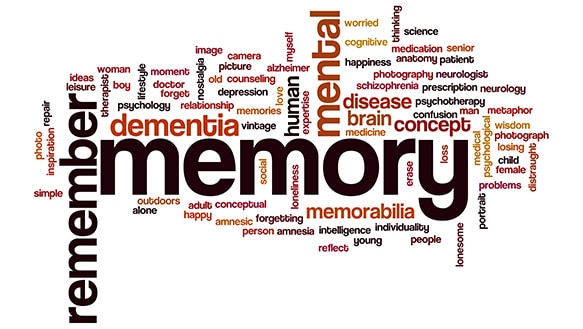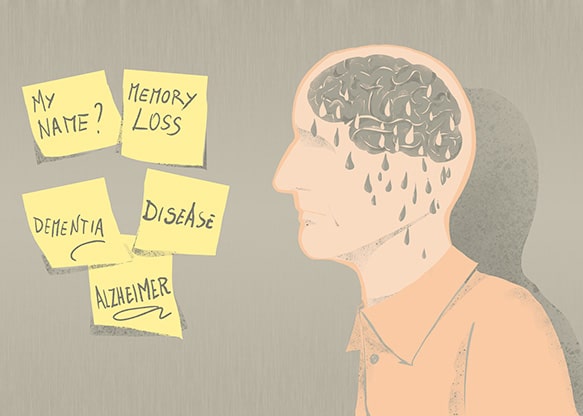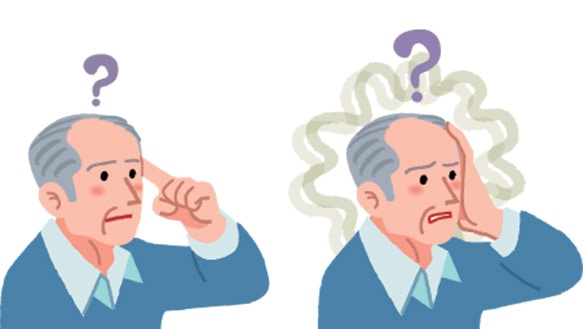In this article, we will look at how your diabetes affects memory and when and why this happens. To do this, we need to understand the four different types of memory loss. Also, looking at the symptoms and causes of memory loss will be helpful as we seek to learn how our Type 2 Diabetes may affect our memory.
To further break it down, we will look at the two types of memory loss that results from Type 2 Diabetes, short and long-term memory loss.
Contents
Types of memory loss or amnesia
There are four different types of memory loss. The two that are most common, and that you may have heard of, are short-term memory loss and long-term memory loss.
The other two types of memory loss, sensory memory loss and working memory loss, may not be as well-known. However, they are important to the preservation of human memory, thought and cognitive processes. As with many parts of the human body, memory loss is a complex issue. It involves many different factors, of which Type 2 Diabetes is one.
Short-term memory loss
The first sign of cognitive decline and one of the first symptoms of memory loss is short-term memory loss. I see this with my mother, when she doesn’t remember my dog’s name, or anything about the story that I just told her related to when I got him, how old he is, and all those details about pets that people may ask.
Forgetting where they placed everyday objects, or forgetting what they went into a room to get can become an everyday occurrence. A set of keys becomes misplaced, money is lost, common objects are hidden away, and the hiding place forgotten.
My mother has taken to hiding pots and pans under beds. She will lose a twenty-dollar bill that my father just gave her. Two minutes after that, she can’t seem to remember that he gave her any money at all.
She may remember that she just got back from church, and that they ate, but she wouldn’t be able to recall the context of it. She doesn’t remember that she was raising money for any certain cause. She doesn’t understand or remember that my father has had three stints placed in his heart. She doesn’t remember his procedure a week ago.
It was the first symptom of Alzheimer’s disease that we noticed in my mother. She would ask us for information only given a few minutes ago. She would write down addresses, but didn’t remember that she had written them down at all, or where she had penned them.
Sensory memory loss
My mother, on top of her diagnosis of Alzheimer’s disease, also has sensory memory loss. She wears hearing aids which she doesn’t like to wear. She will hide them, forget where she put them, and lose them. My father hasn’t had much success in keeping her from losing her hearing aids.
Consequently, you often wonder if part of her memory loss is due to her hearing loss. One symptom of Alzheimer’s disease that she has had lately seems to be related to the anxiety related to memory loss, and which manifests itself in the form of hearing choir music. This is an actual thing, and my mother has it. A mild anti-anxiety has helped relieve it.
When you hear choir music 24/7, you also have trouble hearing anything else. Sensory hearing loss is just one of the many sensory issues that can cause a disruption in what is sometimes called the shortest memory. Experiences related to seeing, tasting, feeling, and all senses that require short-term memory may be affected.
If you hear something, but don’t process it instantly, within minutes, it can be lost. This is also true of those things seen, or smelled. When you attempt to test several perfumes or colognes, the first stays with you, and the rest tend to run together as you become bombarded with scents.
The shortest memory loss then is difficult, because there can be so many different sensory stimuli coming at you at one time. So many that you lose track, and it’s difficult to think that this type of memory loss could be due to anything serious. Most people experience some forms of sensory overload. Therefore, these subtle symptoms may be a first sign of memory loss that goes unnoticed, or mistaken for something else.
Working memory loss
Early on in my mother’s Alzheimer disease, working memory was lost. We noticed that my mother, who always cooked intricate family meals, couldn’t no follow recipes. She couldn’t remember how to operate a vehicle. She couldn’t drive any longer.
Working memory goes along with short-term memory, and decline amounts to the de-cabinetry of our brains. We can’t sort and store information like we used to. It’s like someone took all the cabinets out of our kitchen, and the pots and pans are all over the floor. It’s like someone took the cabinets from your outlook files, and left it a jumbled mess.
Organization skills are lost, which result in a loss of functional activities of daily living. My father now cooks everything, or pick up meals. At family meals, my mother helps, but you must guide her through every step, and when you turn the oven on, or bring a pot out, she will go along behind you and cut the roast off, or put the pot back up under the bed upstairs, where she has taken to hiding the pots.
Once short-term memory goes, and as it goes, working memory disappears as well.
Long-term memory loss
The last thing to go in Alzheimer’s disease is long-term memory. My mother can currently tell you who her brother and sisters are in old photos. She recognized old photographs of us, her children.
She hasn’t lost long-term memory, but when that does fade, I can see how a large portion of who I knew as my mother will be gone. She will no longer be able to remember us, our childhood or how to perform simple daily functions.
The loss of memory, progressing from sensory, to short, to working, to long, can take years but as in the case of Alzheimer’s disease, can take a devastating toll on the person’s quality of life, family members, and the community. 1
I suggest reading the following articles:
What are the causes of memory loss?
Memory loss, sometimes called amnesia, can be caused by many different things. These include the side effects from many different medications to diseases such as dementia or Alzheimer’s’ disease, and Type 2 Diabetes. To treat it, determining the root cause is important.
Some of the many causes of memory loss or amnesia are listed below:
- Depression and anxiety
- Thyroid disease
- Stress
- Head injury and concussion
- Stroke
- Vitamin B deficiency (VitB1)
- Trauma (amnesia due to psychological causes)
- Medications (sedatives, cholesterol medications (statins), Parkinson’s disease medications)
- Alcohol use
- Uncontrolled blood sugars over time
- Low blood sugar
You may have heard that “old age” is a cause of memory loss. Certainly, those over 65 years old have more memory issues than compared to the general population. Age does seem to have some bearing on the preservation of memory and cognition. It’s estimated that about four out of every ten elderly person over the age of 65 have some form of memory loss.
Recognizing symptoms of memory loss
The symptoms that come with gradual memory loss range from losing short term memory, where you can’t recall where you placed your keys, for example, to forgetting what you were doing. Short term memory forgetfulness includes forgetting where many or even all objects that were once familiar to you are kept in your home.
As time goes on, and short-term memory lessens, you can forget the names of loved ones and those closest to you in life. This is a sad fact of Alzheimer’s disease and dementia, which breaks the heart of many a family member who is stared at blankly during their visit, when at the previous visit they were welcomed and remembered.
Anyone can forget things sometimes, but a pattern developing over time starts to signal deeper issues, as symptoms become more apparent. 2
Does Type 2 Diabetes directly affect my memory loss?
Yes, Type 2 Diabetes can directly affect your memory.
In diabetes, it can happen during episodes of low or high blood glucose levels
High blood sugars and memory
High blood sugars over time can lead to atherosclerosis in the brain. When vessels harden in the brain and get blocked or blood flow gets slowed down, the person with Type 2 Diabetes is more susceptible to loss of memory and cognitive deficits.
Low blood sugars and memory
Conversely, low blood sugar can also cause short term memory problems as confusion from a low blood sugar sets in. This is remedied by a successful treatment of low blood sugars, and their prevention to avoid confusion and subsequent memory loss.
Good diabetes management and memory loss from Type 2 Diabetes
Good diabetes management, and avoidance of low and high blood sugars, while sticking to your targets, can help to prevent acute memory loss from low blood sugars and long-term memory loss from high blood sugars. 3
Alzheimer’s disease is strongly connected to high blood sugar levels
Now, to further understand this connection between Type 2 Diabetes and memory loss, we will look at the results of research into the subject.
One study in this area showed that both men and women with Type 2 Diabetes had more cognitive decline and memory loss than those without Type 2 Diabetes of the same age bracket. Mental focus, attention levels, and memory were correlational to the blood sugar levels. The higher blood sugars, the more memory loss and confusion that was reported in the subjects.
It didn’t seem to matter how long a subject had diabetes. They still experienced memory loss. Possibly, this is accounted for with the amount of “fuzziness” that people with Type 2 Diabetes feel. When blood sugars are high, the acute response is a fatigue and mental fuzziness, so it only makes sense that over time, the cumulative effect would be a loss of memory. This, coupled with what we know diabetes does to blood vessels over time, large and small, we can deduce that high blood sugars over time could “clog the brain,” stopping needed nerve impulses in the brain from travelling.
Recently, there has been so much attention to Alzheimer’s disease role as insulin resistance in the brain, and how medications such as metformin and inhaled insulin (Afrezza) could be used to help the brain cells take up needed sugar from the blood.
Much research still needs to be done in this area, but what we do know is that with Type 2 Diabetes, there is a decline in memory and cognition that is greater than the rate for the general population. That’s one third of the population with Type 2 Diabetes, or one in three. Those numbers are staggering!
More research into the correlation between brain, cognitive decline and diabetes needs to be done. One significant revelation that has come out of research that has been done already is that people with diabetes are also more likely to be diagnosed with Alzheimer’s Disease.
Due to the debilitating nature of Alzheimer’s Disease, and its physical and mental costs, as well as the financial burden for both the person with Alzheimer’s disease and the family, it should be avoided at all costs, and a cure found. Currently, there are little treatments that effectively slow the progression of symptoms, and they persist along a predictable, yet individual path to complete cognitive decline.
Scientists don’t yet know why Type 2 Diabetes leads to Alzheimer’s disease. There are theories about vessel damage and blockage at the brain level, and inflammation that slows blood flow. Research supports these theories, but it’s not consistent in how one relates to the other.
One study published in the Archives of Neurology used data synthesized from the Health ABC (Health, Aging and Body Composition study that observed people with Type 2 Diabetes in the aging population in two states. Analyzing data from some 3,069 study participants showed that about one fourth of the participants had Type 2 Diabetes. Some didn’t have it at the beginning of the study, but later developed the disease.
Memory tests and cognition indicators were performed looking at concentration and ability to balance and coordinate movements and thoughts. Subjects who had diabetes scored lower in the beginning of the research study.
Following these same subjects through a number of years showed that they had more cognition and memory issues over time, at a greater rate. There was less impairment in those who had just been diagnosed, as opposed to those who had the condition over an extended period of time.
Prevention and overall management of diabetes once a person has it are that much more important with these research findings. Still, the dangers of normoglycemia in the elderly still remain. As more and more elderly people with diabetes are isolated, and memory and cognitive decline are common, trying to run the blood sugar too low could result in hypoglycemia. For safety reasons, it is a high priority to avoid low blood sugars in the elderly. 4,5
How to cope with it?
The best way to cope with memory loss related to diabetes is to be proactive in order to prevent it by managing your low and high blood sugars, eating a healthy diet while watching your carbohydrates, being active at least 30 minutes, five days per week, and losing some weight if you need to.
Talk with your healthcare provider about ways to better manage your diabetes if you are not in your target ranges for your A1C and blood sugar levels. In addition, manage your blood pressure and cholesterol to avoid heart disease, and diseases of the arteries which can also affect blood vessels in the brain, leading to memory loss.
If you already have some memory loss, it’s even more of a reason to manage your diabetes. Excessively low or high blood sugars may cause your memory to get fuzzier. Confusion is common with low blood sugars, and fatigue and difficulty concentrating are common with high blood sugars.
The best bet is to manage your blood sugars, while keeping your brain active, by doing crossword puzzles, reading, playing interactive games and memory games. Have your neurological status checked. The doctor can perform memory evaluations, and CT scans and MRI’s can map out any changes in your brain for doctors to be aware of.
Further reading:
Treating and prevention of memory loss
In order to prevent memory loss when you have Type 2 Diabetes, you need to learn some tips. It’s not impossible to live healthy with diabetes. In fact, it’s quite probable that you will live healthy with it if it’s managed well. This means knowing your diabetes numbers, your blood pressure and cholesterol numbers, and working to keep them in your target ranges.
Still, if you have Type 2 Diabetes, you may likely experience some memory problems any time your diabetes is not in check. Even well managed, you can sometimes have a high or low blood sugar when you have diabetes that can result in some short-term memory loss. Enough high blood sugars over time, and you could begin to have signs of long term issues with your memory loss.
So, what can you do to prevent problems with your memory related to your diabetes? One thing is to prevent high blood sugars, which damage a part of your brain called the Hippocampus. This area of the brain is responsible for memory, and high blood sugars over time can decrease its functioning ability.
Knowing that you are wondering now how can you possibly be perfect with your diabetes management, you need to understand that you don’t have to be. You should be as diligent as possible, and avoid lows and highs of blood sugar when you can.
You may need to be more insistent with your healthcare provider about new medications to really get that A1C under 7% this time. Perhaps it’s getting really active, and finding new ways to enjoy yourself outdoors. Perhaps you need a diabetes education refresher course, or a support group.
Whatever it is that you need, keeping your body from declining, as well as your mental well-being, are extremely important with diabetes as we are an aging population. As we live longer, we want to stay healthy if we can, and that includes our memory and cognition that allows us to perform activities of daily living that keep us independent.
Striving for excellent diabetes control will protect other organs in your body that can become damaged over time from high blood sugars.
In addition to performing your daily self management tasks related to your diabetes, you need to keep your brain active. Take a class. Go on a trip. Take photography. Do anything that stimulates your senses, allows you to use deep thought processes, and cognitively figure things out. Good mental activity can sharpen the mind just as exercise can tighten the body, and increase vitality.
If you are having trouble remembering things, tell a significant other and keep things written down in one place that the other person knows about. Don’t stay cooped up at home, and get out to socialize, and stimulate your mind with lively conversation with others.
Use organizational tools to help you organize your life, and make needed objects, and phone numbers more accessible. Have a work station for weekly bills, and a filing system. If you don’t do computers well, an old-style filing system will work fine to make sure that you keep needed household bills and memos in one area where you can find them.
Make sure you get plenty of shut eye at night. Don’t underestimate the benefits and stress relief provided by a good night of eight hours sleep.
Is your diet dragging you down? Change it up. Switch out your current fare for a Mediterranean heart-healthy diet. Swap out bad fats for good fats, ditch Trans and saturated fats, and add in good carbohydrates, high in fiber. Along with lean protein, this diet, when done right, can help you to reach your self-management goals.
If you smoke, it’s time to quit. It’s extremely bad on your circulation with diabetes, as nicotine tries to bind with your hemoglobin. Hemoglobin is what carries the oxygen in your cells. You’ve then also got circulation problems that you are going to make worse with a cigarette. It’s time to talk to your doctor about the best proven method to help you stop for good. 6
Clinical research trials have shown that early and long-term control of low and high blood sugars helps with the progression of complications that occur at a microvascular (small vessel) level. With not enough insulin, or insulin that isn’t working properly, there are higher levels of inflammation in vessels large and small.
This helps with all related long-term complications of diabetes, because all of the body’s systems are fed by a network of small and large blood vessels. Keep your brain healthy, and keep your body healthy, is the message to take home. 7,8
I recommend the articles below for further information:
Over to you
Let us know if you are experiencing memory loss related to your diabetes. You could also check and do some memory games to see how your memory is like. Have you talked with your doctor about it? What kind of treatment has worked or is working for you? We hope that you have been able to keep your mind sharp by keeping your diabetes numbers in a target, which generally means you are doing things that will help you live healthy with diabetes for years to come. Let us know what your comments are on this topic in the comments box below.
TheDiabetesCouncil Article | Reviewed by Dr. Christine Traxler MD on May 24, 2020
References
- http://www.terravistafoundation.org/four-types-memory-loss/?gclid=Cj0KCQiAyNjRBRCpARIsAPDBnn02C-baY3c1uF_i43AMVDwdhPdXqpVVwoID49NbzSaF1AejTeG209waArmUEALw_wcB
- https://www.healthline.com/health/diabetes/diabetes-and-memory-loss
- http://www.diabetes.co.uk/diabetes-complications/diabetes-and-memory-loss.html
- https://www.healthline.com/health/diabetes/diabetes-and-memory-loss
- https://www.webmd.com/diabetes/features/type-2-diabetes-memory#1
- http://www.improve-memory-skills.com/diabetes-and-memory-loss.html
- https://www.ncbi.nlm.nih.gov/pubmed/15619272
- https://www.ncbi.nlm.nih.gov/pubmed/27025794












